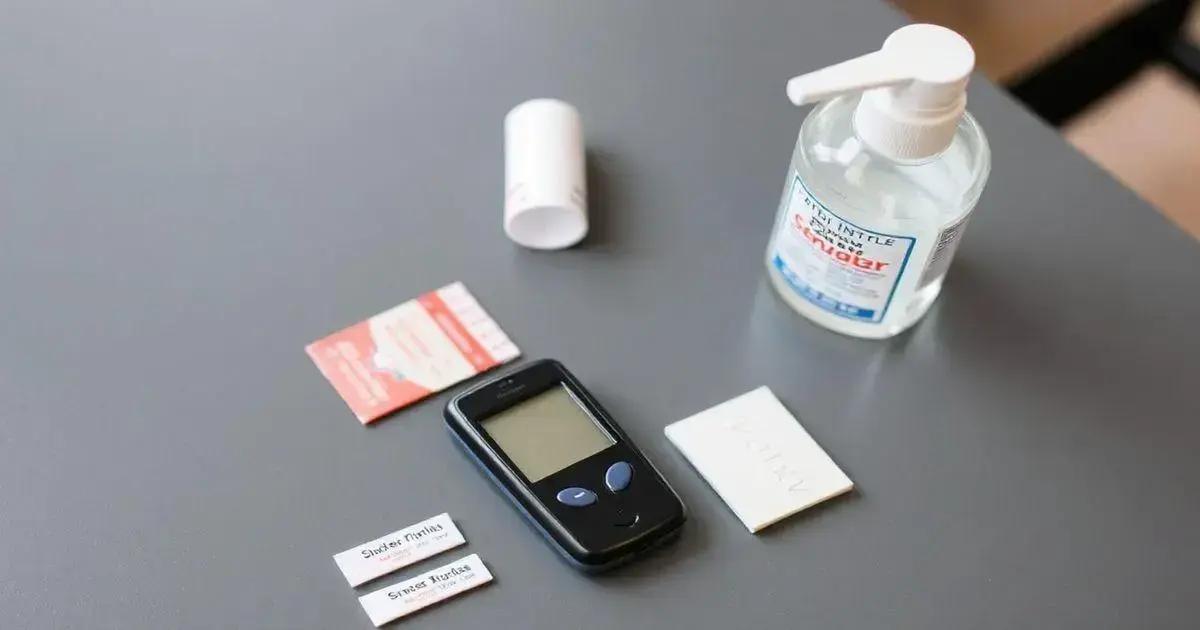The importance of regularly checking blood sugar levels lies in its ability to help manage diabetes, prevent long-term health complications, and provide insight into how food, exercise, and medication affect your body, ultimately empowering you to maintain better overall health.
Regularly checking blood sugar levels is crucial for maintaining overall health, particularly for those with diabetes. Understanding how blood sugar fluctuations affect the body can empower individuals to make informed decisions about their health. In this article, we will delve into why monitoring blood sugar levels is important, how to do it correctly, and the significant impact it has on one’s well-being.
Why Regular Blood Sugar Monitoring Matters

Regular blood sugar monitoring is vital because it helps you understand how your body responds to food, exercise, and medication. By checking your levels often, you can learn to manage your diabetes better. Knowing your blood sugar patterns can guide you in making healthier choices.
Why It Matters
When you monitor your blood sugar, you can detect when levels are too high or too low. High blood sugar can lead to serious health issues, while low blood sugar can cause confusion and faintness. Recognizing these changes quickly can save you from dangerous situations.
Preventing Long-Term Complications
Monitoring your blood sugar regularly can prevent long-term health problems like heart disease, kidney damage, and vision loss. Keeping your levels in check reduces the risk of these complications, ensuring you stay healthy and active.
Empowering Yourself
By taking control of your blood sugar monitoring, you empower yourself to lead a healthier life. You will feel more confident in your ability to manage your diabetes. This proactive approach can lead to improved overall health and well-being.
Engaging Your Healthcare Team
Frequent monitoring allows you to communicate better with your healthcare team. Sharing your blood sugar logs can help your doctor understand your condition and adjust your treatment as needed. This teamwork is crucial for effective diabetes management.
Understanding Blood Sugar Levels

Understanding blood sugar levels is essential for managing your health, especially if you have diabetes. Blood sugar, or glucose, provides energy for your body’s cells. However, too much or too little glucose can cause various health issues.
Normal Blood Sugar Ranges
Normal blood sugar levels generally range from 70 to 130 mg/dL before meals and below 180 mg/dL two hours after eating. Knowing these numbers can help you understand when your levels are healthy or need attention.
What Affects Blood Sugar Levels?
Several factors can influence your blood sugar levels, including diet, exercise, medication, and stress. Foods high in carbohydrates can raise glucose levels, while physical activity can help lower them. It’s important to note how your body reacts to different situations.
Signs of Unhealthy Blood Sugar Levels
When blood sugar levels are too high, you might feel thirsty, tired, or notice frequent urination. Low levels can cause shakiness, sweating, or confusion. Recognizing these signs early can prevent severe complications.
The Role of Insulin
Insulin is a hormone that helps your body use or store glucose from food. People with diabetes often struggle with insulin production or effectiveness. This can lead to unstable blood sugar levels, making monitoring vital.
Best Practices for Checking Blood Sugar

Checking your blood sugar correctly is essential for managing your health. Here are some best practices to ensure accurate readings.
1. Choose the Right Time
It’s important to monitor your blood sugar at consistent times. Check your levels before meals and two hours after eating. This helps you understand how your body reacts to food.
2. Ensure Your Hands Are Clean
Before using the glucometer, wash your hands with soap and water. Dry them thoroughly. Clean hands prevent contamination and ensure accurate readings.
3. Use the Right Technique
When obtaining a blood sample, follow the manufacturer’s instructions. Use the sides of your fingertips and avoid repeatedly pricking the same spot. This helps in reducing discomfort.
4. Keep Equipment Ready
Ensure your glucometer and strips are functioning and not expired. Regularly check batteries and store everything in a clean, safe place. This avoids interruptions in monitoring.
5. Record Your Results
Maintaining a log of your blood sugar levels can help you and your healthcare provider track trends over time. Note down the date, time, and any relevant circumstances like meals or exercise.
How Blood Sugar Affects Your Health

How blood sugar affects your health is crucial for understanding diabetes management. Blood sugar levels can influence various aspects of your body’s systems.
The Impact of High Blood Sugar
High blood sugar can lead to symptoms like excessive thirst, frequent urination, and fatigue. Over time, these high levels can damage organs, including the heart, kidneys, and eyes, leading to serious complications.
Low Blood Sugar Risks
Low blood sugar is just as dangerous. It may cause shakiness, confusion, and even fainting. Severe hypoglycemia can lead to seizures or loss of consciousness. Being aware of these symptoms is vital for quick action.
Long-Term Health Complications
Consistently high or low blood sugar can lead to long-term issues such as neuropathy, vision problems, and cardiovascular disease. Keeping your blood sugar stable is a key part of preventing these complications.
The Importance of Regular Monitoring
Regularly checking blood sugar helps you stay aware of its impact on your health. This awareness allows for timely interventions and adjustments in your diet or medication, leading to better overall health.
In Conclusion: The Critical Role of Blood Sugar Monitoring
The importance of regularly checking blood sugar levels cannot be overstated. It allows individuals to understand their body’s responses and manage their health effectively.
By monitoring blood sugar levels regularly, you empower yourself to make informed decisions about your diet, exercise, and medication, helping to prevent long-term health complications.
Understanding blood sugar levels, recognizing early symptoms of highs and lows, and following best practices for testing can lead to a healthier and more balanced life. Stay proactive in your health management to thrive today and in the future.
FAQ – Frequently Asked Questions about Checking Blood Sugar Levels
Why is it important to check blood sugar levels regularly?
Regularly checking blood sugar levels is vital for managing diabetes and understanding how your body reacts to food and exercise.
What is a normal blood sugar level?
Normal blood sugar levels typically range from 70 to 130 mg/dL before meals and below 180 mg/dL two hours after eating.
What should I do if my blood sugar is too high?
If your blood sugar is too high, drink plenty of water, take medication as prescribed, and consult your healthcare provider for further guidance.
What are some best practices for checking blood sugar?
Best practices include choosing the right time for testing, ensuring your hands are clean, using the correct technique, and recording your results.
How does blood sugar affect my overall health?
Blood sugar levels can impact your energy, mood, and long-term health, leading to complications if not managed properly.
What signs indicate that my blood sugar is too low?
Signs of low blood sugar include shakiness, confusion, sweating, and fatigue. Recognizing these symptoms can help you take action immediately.












